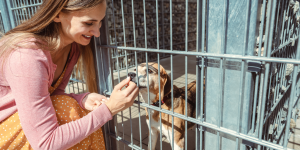Animal Sanctuary Regulation – Are All Animal Sanctuaries Regulated?
Many animal lovers may wonder whether rescue and re-homing centres in the UK are regulated and licensed. The truth is, however; anyone can set up a rescue operation. There is no legislation to comply with and no common regulations which rescues must follow. Holidays4Dogs looks into animal sanctuary regulation and its impact on animal welfare.
In November 2022, the BBC News published a story about a dog owner who had been badly bitten by his rescue dog. As a result, the couple from West Sussex, were calling for a change in the law.
Large UK charities such as The Blue Cross, Birmingham and Battersea Dogs home, for instance, have the resources to employ professional experts in animal behaviour and health. In addition, well organised rescue charities will have robust re-homing procedures and back-up support for adopters.
While some smaller animal sanctuary charities may have their hearts in the right place, it is possible they lack the experience and resources of established charities, such as the Dogs Trust.
Rescue centres are ‘drowning in animals’.
Since the COVID-19 pandemic, more dogs than ever are looking for new homes. Animal sanctuaries UK-wide are reporting they are over-flowing and others are having to turn animals away.
The huge surge in people looking to re-home their dogs is, according to the RSPCA, due to the rising cost of living. As a result, they claim they are currently, ‘drowning in animals’.
The concern is – due to the rise in the number of people needing to re-home their dogs, there will be a rise in the number of dog dealers posing as rescue charities and animal sanctuaries.
This might involve a complete ‘scam’ whereby the non-existent charity takes deposits for non-existent dogs. Or, it can be puppy farmers, pretending to be a dog rescue and offering puppies and older dogs ‘for adoption’.
Without proper legislation, it is important for would-be adopters to be aware when they are looking for a rescue animal. Particularly, if this involves on-line searching, for the pet of their dreams.
Points to consider when visiting an animal sanctuary;-
- Is there a thorough assessment process of animals in their care? How long does this process take? What qualifications do assessment staff possess?
- Is the adoption application process robust? This provides shelter staff with detailed information about the type of home offered. It also helps staff to match adopters with suitable dogs.
- Does the rescue carry out home checks, or require references?
- Does the rescue group offer good back-up support should things not work out?
- Animal sanctuaries should be able to provide you a detailed report on the temperament of the dog and what sort of home/experience the dog requires.
- Is the rescue registered with the Association of Dogs and Cats Homes? Although this is voluntary, registration is subject to an independent inspection.
- Are they a registered charity?
All animals are protected under the Animal Welfare Act (2006). However, without animal sanctuary regulation, there is currently no means to monitor the expertise of those in charge of caring for the animals.
Animal sanctuary regulation – final thoughts.
Some animal charities themselves have received reports of poor practice and unsuitable conditions. As as a result, they would like to see all rescue establishments licensed. This will ensure rescue animals are cared for and re-homed in the best way possible.


